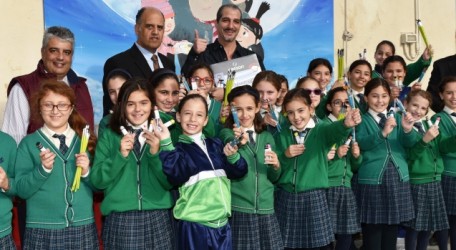
HSBC Catch the Drop launches new three-year art project with Edaav
After distributing water-saving material from recyclable bottles to push-taps to thermostatic mixing-valves in schools across Malta, the HSBC Water Programme – Catch the Drop will now be handing watercolours to students to draw their own vision of water as an essential resource.
The project, ‘Imagine Water, Catch the Drop’, takes its colours from a newly-established partnership between HSBC Bank Malta and l’association École d’art au village (Edaav). It will engage artists, teachers, and students in a long-term and meaningful creative process while raising awareness of the importance of water to the Maltese islands. The students will be encouraged to stir emotions using the power of a variety of media such as photography, video, music, collage, or installations.
‘Imagine Water, Catch the Drop’ runs for three scholastic years from September 2015 to May 2018, and will trace the footsteps of the HSBC Water Programme – Catch the Drop.
French artist Sébastien Cailleux will serve as the Edaav project coordinator and will work with a total of 125 students per year from five classrooms in three schools in collaboration with the Ministry for Education and others.
At the first distribution of drawing material at the Mater Boni Consilli – St Joseph School, Paola, Sébastien Cailleux said: “Edaav has inspired more than 10,000 students in 23 countries. But the one common thread among all the projects is that they focus on the children of the world. It is fascinating to see these young students transform the world around them using a (small piece) touch of colour.”
At the end of three years, a series of exhibitions and publications are also planned.
The HSBC Water Programme – Catch the Drop is the largest ever national environmental and educational campaign of its kind in Malta with an aim to forge a blueprint for progress on sustainability of water as a resource. The programme was launched in 2013 with an aim to educate nearly 50,000 school-going children in the country.
- February 11, 2016 No comments Posted in: Volunteers Tags: Catch the drop, Edaav, HSBC





